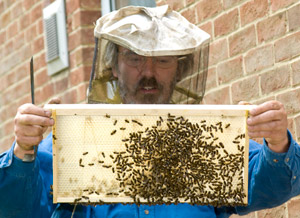- 15 July 2008
New University of Sussex research lab a hive of industry

Keeping busy: New Professor of Apiculture Francis Ratnieks
Good news for the hardworking honeybee and for beekeepers - the University of Sussex has installed the UK's only Professor of Apiculture.
Professor Francis Ratnieks will head the newly-created Laboratory of Apiculture and Social Insects at the University. Professor Ratnieks is a leading authority on honeybee biology, beekeeping and other social insects - the bees, wasps and ants that live in colonies with a queen and workers - in general.
Professor Ratnieks and his students will study honeybees, stingless bees, ants and wasps, with the biggest part of the work being on the honeybee. The three main areas of research are: how do honeybees and insects organise themselves; how do they resolve their conflicts over who works and who lays eggs; improved beekeeping practices, honeybee diseases, breeding and conservation.
The study of honeybees and social insects, says Professor Ratnieks, offers insights into aspects of social living that could benefit man: "Humans are relative newcomers to social living compared to bees. We could learn much from social insects that have lived in complex groups for tens of millions of years. Insect societies face many of the problems faced by human society, including maintaining public health, organising efficient information and transport systems and by maintaining harmony in the group. By pollinating many of the plants that we eat, honeybees are also vital for agriculture."
The £250,000 facility, which is next to the main biology building but also on the edge of campus with a wood on one side, comprises a research lab with offices. There are special facilities for studying honeybees including space to keep ten observation bee hives, a workshop for assembling and storing bee hives, an apiary for bee hives in the land beside the lab, plus additional apiaries on the University campus.
Professor Jonathan Bacon, the Dean of Life Sciences at Sussex and a recent convert to the study of honey bees and social insects, says: "I am very pleased that we have been able to bring Francis Ratnieks to the University of Sussex. This greatly expands our existing strengths in social-insect studies at Sussex and makes us the UK leader in this area. Sussex is a great place for studying honeybees and social insects. We are located near the South Coast. The weather here means that we can study bees most of the year. Social insect biodiversity is also high, with many species living wild on the campus or nearby. And being a campus university in the countryside, Sussex had the space for a new laboratory and the apiaries needed to keep bee hives."
The launch should also be welcome news for UK bee keepers concerned about the lack of Government investment in bee research. Beekeepers see research as vital to the continued success of commercial beekeeping, which is important to the economy and the environment but threatened by factors such as disease, pests and environmental degradation.
Honeybees are the major pollinators of agricultural and wild plants, pollinating around £165m worth of crops in the UK annually. They also produce honey and wax, but their importance to scientists doesn't end there. Professor Ratnieks says: "The honeybee is the gateway to biology - a huge range of important questions in biology, from agriculture to genetics, can be studied in this one species."
Notes for editors
NB The University of Sussex is NOT offering beekeeping degree courses.
FASCINATING FACTS ABOUT THE HONEY BEE:
- Honeybees (Apis mellifera) are the world's most important pollinators. They pollinate billion worth of crops in the United States alone each year. Many crops, especially fruits, cannot develop without pollination.
- The queen bee is the mother and chief egg layer. All other females are called workers. They care for the queen's offspring, collect nectar and maintain and defend the hive. Worker bees are not sterile - they can lay eggs but these are killed by other workers. Male bees are called drones. They don't do any work. They seek out young queen bees on their mating flights.
- Worker bees tell fellow workers where to find the best sites to collect nectar and pollen from flowers by dancing - the waggle dance is the most complicated animal signal that scientists have discovered to date;
- Bees are actually hairy vegetarian wasps;
- The oldest known bee is a 100-million-year-old fossil found encased in amber in Myanmar (Burma);
- There are 17,000 known species of bee. The honeybee is just one of these species. Most bees do not live in colonies.
- Scientists believe that bees are responsible for the rich flower diversity we enjoy today, by dispersing pollen - needed for the development of seeds - from one plant to another of the same type, causing the development of new species over millions of years. Most flowering plants cannot self-pollinate, so have evolved to attract bees and other insects to do the job for them;
- Honey was the most important sweetener for food and alcoholic drinks in ancient times. So important were these activities that parents named their children after the bees. Both Deborah and Melissa mean "bee", in Hebrew and Greek respectively;
- Humans first took honey from wild bee colonies before they reared bees. The activities of beekeepers today are increasingly important as the numbers of natural pollinators in the wild continue to decline due to pollution and the destruction of habitats in the wild;
- A queen bee can lay up to 2,000 eggs a day.
For further information, interviews and photographs, contact the University of Sussex Press office.
Press office contacts: Maggie Clune and Jacqui Bealing. Tel 01273 678 888 or email press@sussex.ac.uk